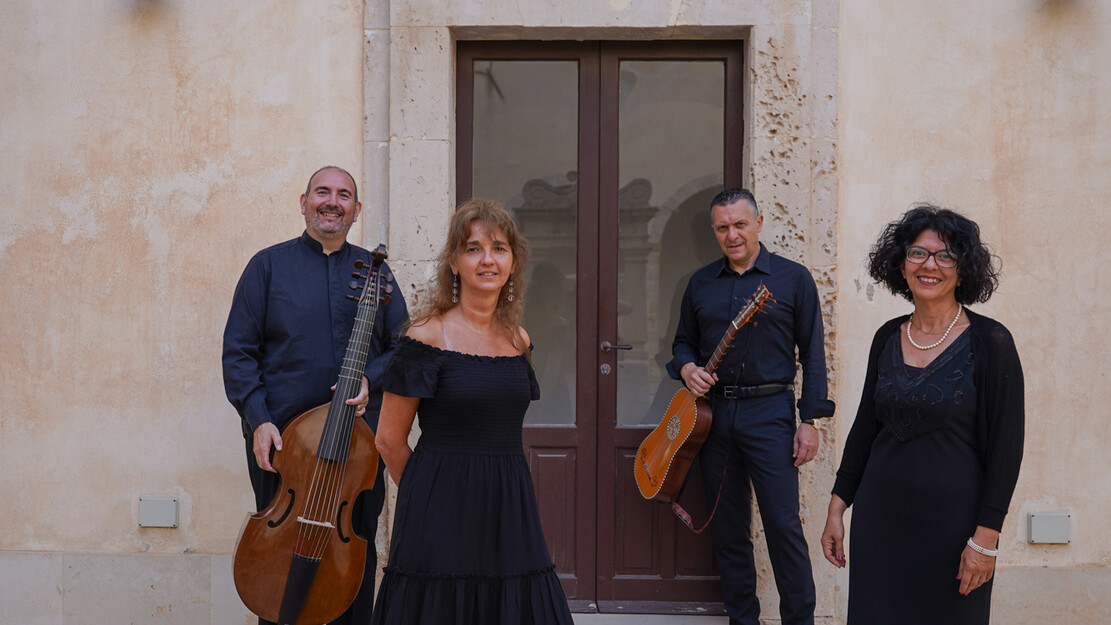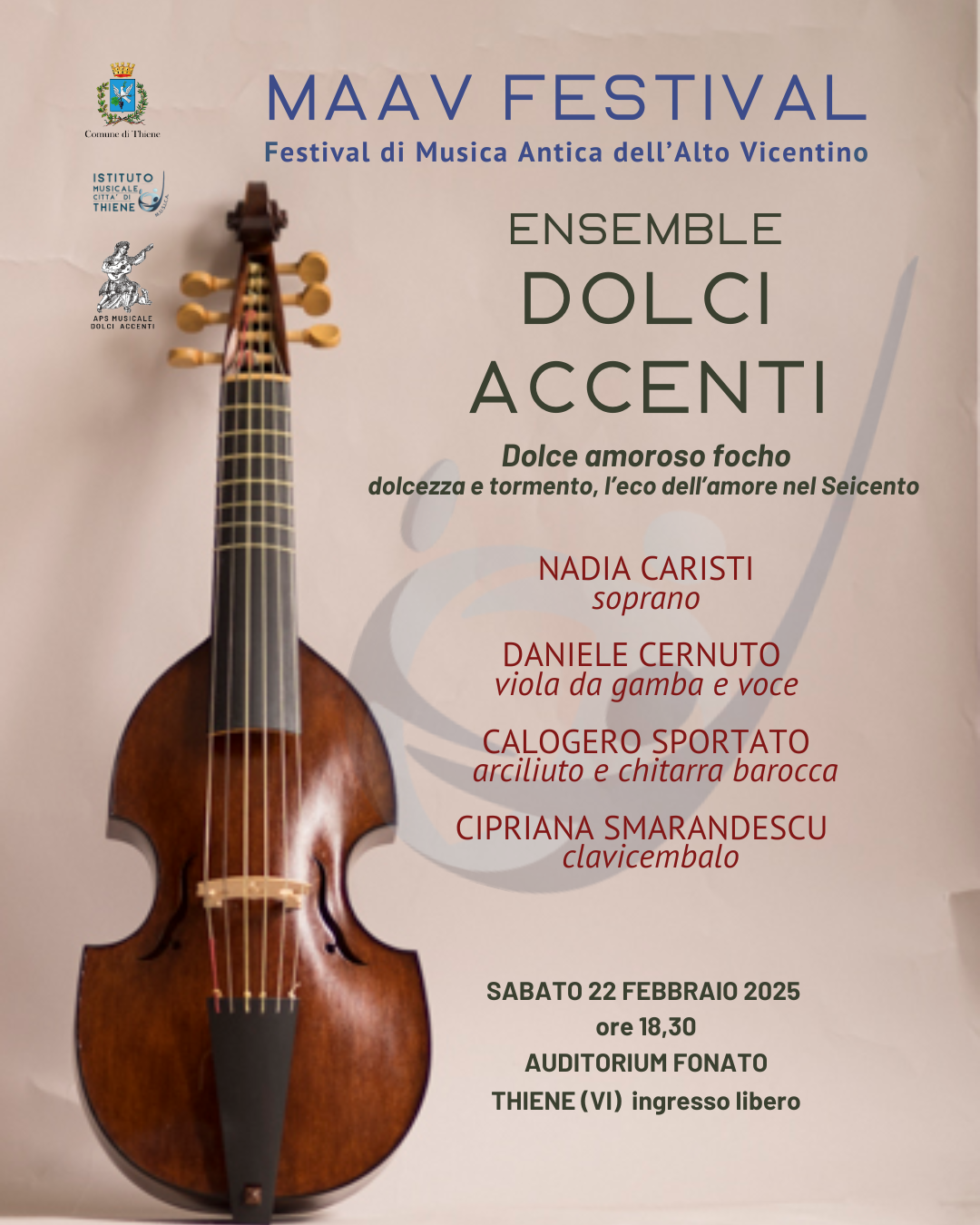MAAV festival
22 February Italy / Thiene
The MAAV is the Early Music Festival of Alto Vicentino, organized by the Istituto Musicale città di Thiene. Thiene is an ancient town north of Vicenza, rich in history and traditions
“Dolce amoroso focho” is a program that intertwines the power of music with the depths of the human soul, offering a vision of love through stories of unrequited feelings and emotions not always returned. Composers of the late Renaissance and early Baroque—such as Biagio Marini, Fabrizio Caroso, Girolamo Frescobaldi, Bartolomeo Spighi, and Giulio Caccini—guide us on an emotional journey where desire and suffering meet and clash, telling stories of burning hearts and shattered hopes.
“Dolce amoroso focho” is a program that intertwines the power of music with the depths of the human soul, offering a vision of love through stories of unrequited feelings and emotions not always returned. Composers of the late Renaissance and early Baroque—such as Biagio Marini, Fabrizio Caroso, Girolamo Frescobaldi, Bartolomeo Spighi, and Giulio Caccini—guide us on an emotional journey where desire and suffering meet and clash, telling stories of burning hearts and shattered hopes.
Music, with its unique ability to evoke the inexpressible, becomes the true protagonist of this universal narrative: the story of unattainable love. The poignant melodies and evocative harmonies of this concert lead the listener through a landscape of complex emotions, where unshared passions create a tension that only dissolves in the confrontation with the reality of unfulfilled hopes.
In this interplay of words and notes, each piece reveals a different facet of love: sweetness that caresses and pain that wounds, hope and disillusion. The protagonists of these stories, condemned to pursue affections never returned, offer us an intimate glimpse into the human condition—suspended between desire and misfortune, in a constant oscillation between life and death, dream and reality.
Founded in 2000, the musicians of the ensemble Dolci Accenti come from diverse artistic and cultural backgrounds. They met during their studies at the Conservatorio di Vicenza, where they specialised in the performance of seventeenth- and early eighteenth-century repertoire, deepening their knowledge through the study of original sources such as treatises, musical scores, prints, manuscripts, and chronicles of the time.
Founded in 2000, the musicians of the ensemble Dolci Accenti come from diverse artistic and cultural backgrounds. They met during their studies at the Conservatorio di Vicenza, where they specialised in the performance of seventeenth- and early eighteenth-century repertoire, deepening their knowledge through the study of original sources such as treatises, musical scores, prints, manuscripts, and chronicles of the time.
Alongside their interest in instrumental music of this period, they also turned their attention to vocal repertoire and its expressive potential. The ensemble, performing on copies of historical instruments, is particularly dedicated to interpreting the musical production of one of the most flourishing, varied, and rich eras in European—especially Italian—music.
Among many concert institutions, Dolci Accenti has been invited to the Festival of Medieval Arts in Sighisoara (Romania), where they recorded for Romanian Radio, and to Vilnius (Lithuania) at the Lietuvos Musikos Akademia. From 2002 to 2006 they were regular guests at the Monte Acuto Festival (Sardinia), and in the following years they appeared at Amici della Musica in Milazzo and Caltanissetta, the Bellini Association of Messina, the International Festival of Bosa, Festival delle Bocche, Sonorità Riservate, Note senza tempo, Brianza Classica, Ravenna Festival, the Italian Consulate in Wolfsburg (Germany), Festival Voci d’Europa, Ente Concerti di Oristano, Nuoro Baroque Festival, Festival Internacional de Música Antiga de Caimari (Palma de Mallorca), Festival Internazionale del Val di Noto Magie Barocche, Le Vie del Barocco Festival in Genoa, Musica Felix in Foggia, Festival Baroknich Umeni in the Czech Republic, and the Festival de Música Antigua in Zaragoza.
The musicians of Dolci Accenti collaborate with leading Italian and international ensembles, including I Barocchisti, Radio Svizzera Italiana, Venice Baroque Orchestra, Auser Musici, and De Labyrintho, to name only a few, and have recorded for labels such as Tactus, Stradivarius, Glossa, Sony, Naxos, Deutsche Grammophon, K617, Arts, Bongiovanni, Dynamic, CPO, and others.
The musicians of Dolci Accenti collaborate with leading Italian and international ensembles, including I Barocchisti, Radio Svizzera Italiana, Venice Baroque Orchestra, Auser Musici, and De Labyrintho, to name only a few, and have recorded for labels such as Tactus, Stradivarius, Glossa, Sony, Naxos, Deutsche Grammophon, K617, Arts, Bongiovanni, Dynamic, CPO, and others.
Dolci Accenti has recorded Bitte Ruhe, the complete unpublished sonatas for viola da gamba and basso continuo by Fr. Ruhe; Occhi vaghi e leggiadri, a collection of seventeenth-century Italian vocal and instrumental music (Urania Records); and most recently, for Brilliant Classics, the Sonatas for Cello and Basso Continuo op. 4 by Giovanni Battista Sammartini.
Dolce amoroso focho
dolcezza e tormento, l’eco dell’amore nel Seicento
Diego Ortiz (1510-1570) Recercada quarta
Giulio Caccini (1510-1570) Al fonte al prato
Antonio Valente (1520-1601) Lo ballo dell’Intorcia
Bartolomeo Spighi O Piaggia felice
Francesco Caroso (1536?-1605?) Spagnoletta
Girolamo Kapsperger (1580-1651) Aurilla mia
Biagio Marini (1594 – 1663) Hor che l’alba
Antonio Valente (1520-1601) La Romanesca
Diego Ortiz Recercada primera
Girolamo Frescobaldi (1583-1642) Begli occhi non provo
Giovanni Stefani (1618-1626) Bella mia questo mio core
Aria sopra la ciaccona
Andrea Falconieri (1585-16569 La Monarca
Fabrizio Caroso (1526-1600) Pass’e mezzo
Dolce amoroso focho
Adrian Willaert (1490-1562) O bene mio
Bernardo Pasquini (1637-1701) Partita sopra l’aria della Follia da Espagna
Francesco Patavino (1478-1556) Un cavalier di Spagna
Anonimo Dirindindin
Gaspar Sanz (1640-1710) Canarios
Filippo Azzaiolo (1530-1569) E me levai d’una bella mattina
Andrea Falconieri (1585-1656) Brando dicho el melo
Dolce amoroso focho
dolcezza e tormento, l’eco dell’amore nel Seicento
Diego Ortiz (1510-1570) Recercada quarta
Giulio Caccini (1510-1570) Al fonte al prato
Antonio Valente (1520-1601) Lo ballo dell’Intorcia
Bartolomeo Spighi O Piaggia felice
Francesco Caroso (1536?-1605?) Spagnoletta
Girolamo Kapsperger (1580-1651) Aurilla mia
Biagio Marini (1594 – 1663) Hor che l’alba
Antonio Valente (1520-1601) La Romanesca
Diego Ortiz Recercada primera
Girolamo Frescobaldi (1583-1642) Begli occhi non provo
Giovanni Stefani (1618-1626) Bella mia questo mio core
Aria sopra la ciaccona
Andrea Falconieri (1585-16569 La Monarca
Fabrizio Caroso (1526-1600) Pass’e mezzo
Dolce amoroso focho
Adrian Willaert (1490-1562) O bene mio
Bernardo Pasquini (1637-1701) Partita sopra l’aria della Follia da Espagna
Francesco Patavino (1478-1556) Un cavalier di Spagna
Anonimo Dirindindin
Gaspar Sanz (1640-1710) Canarios
Filippo Azzaiolo (1530-1569) E me levai d’una bella mattina
Andrea Falconieri (1585-1656) Brando dicho el melo



